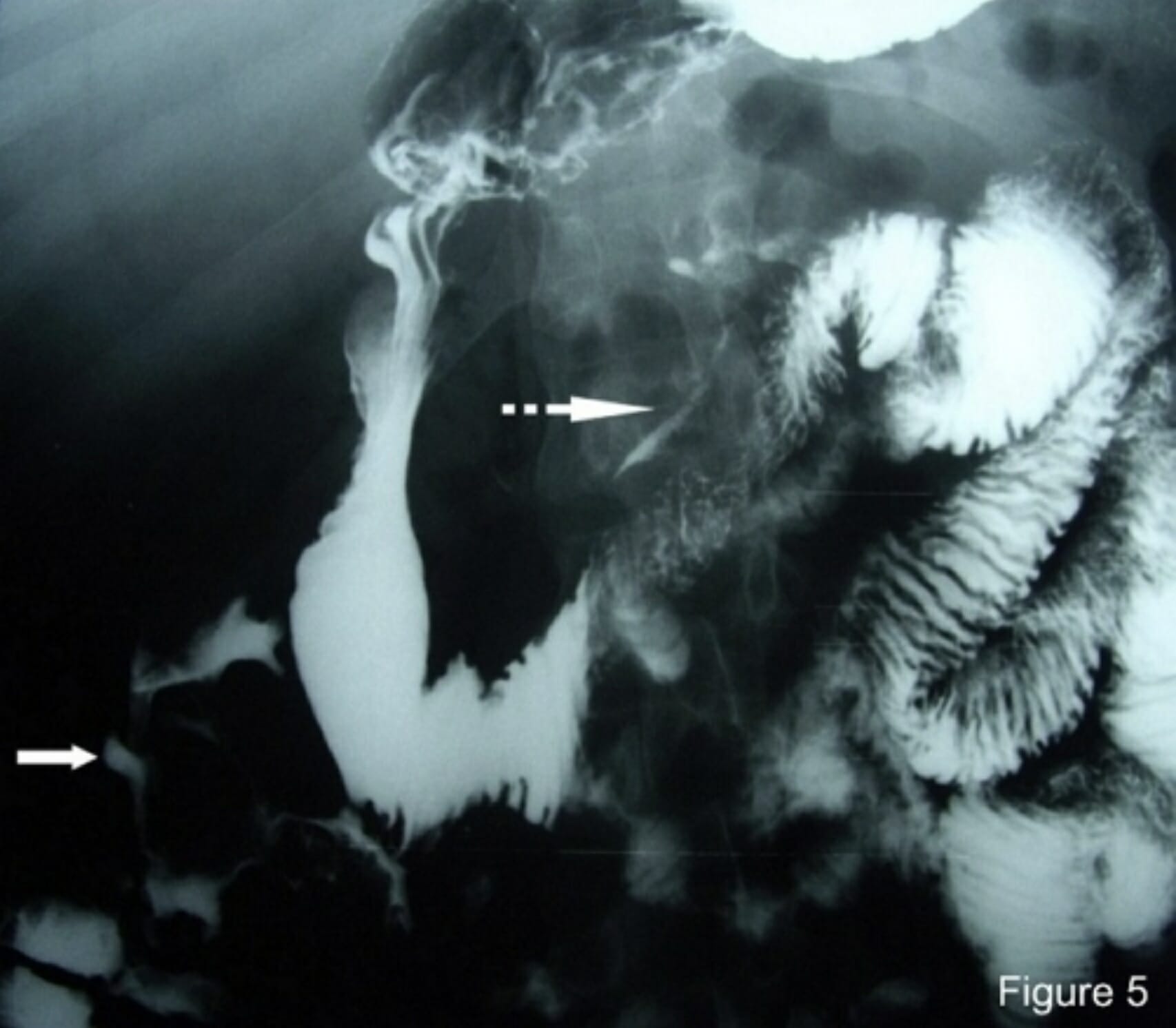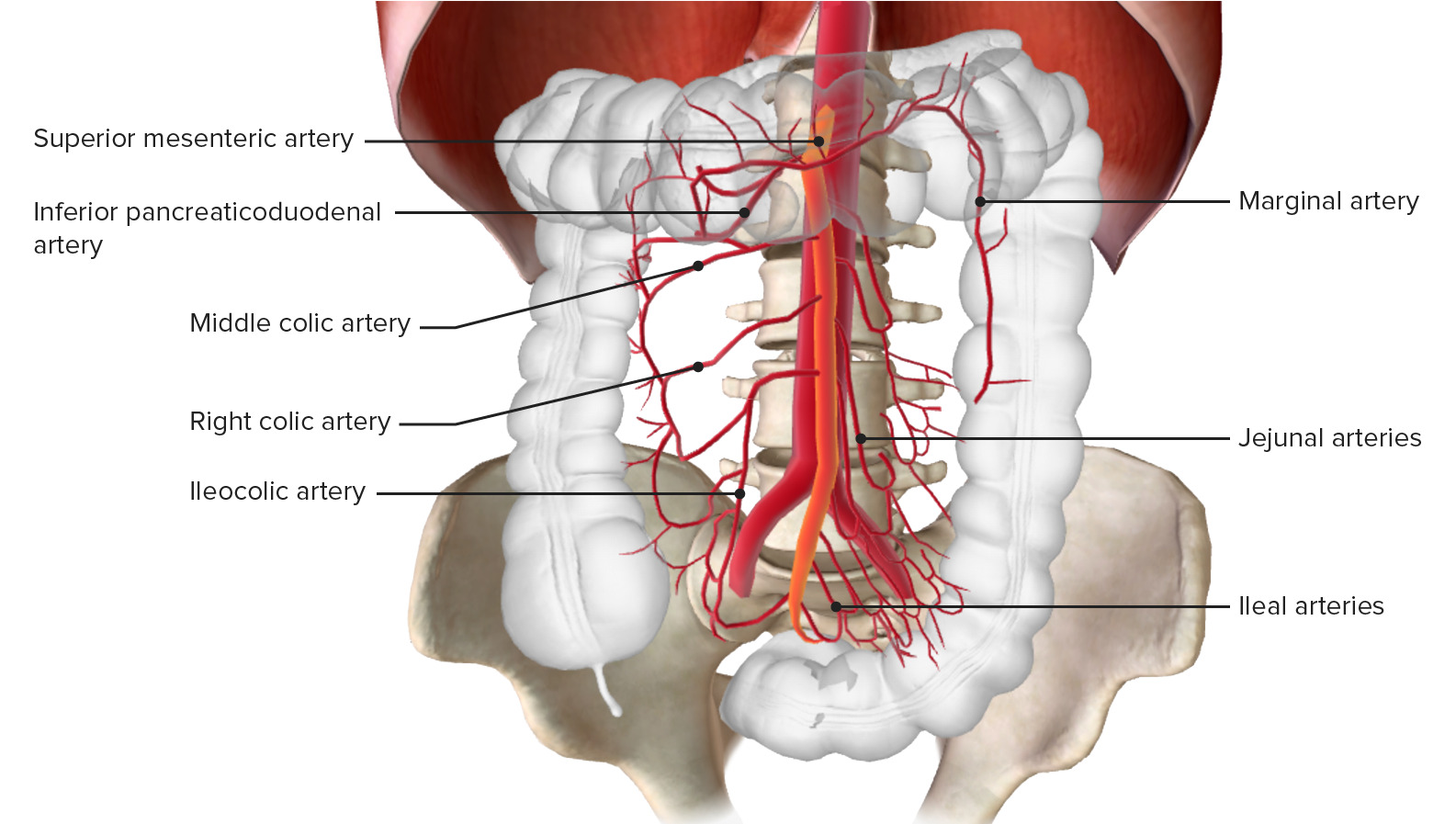Playlist
Show Playlist
Hide Playlist
Acute Mesenteric Ischemia: Examination
-
Emergency Medicine Bord Mesenteric Ischemia.pdf
-
Download Lecture Overview
00:01 Now, the history depends on the underlying cause. 00:05 So, the historic triad is most associated with arterial embolism or with thrombosis. 00:11 Arterial embolism is the classic one that's gonna give you that, kind of, acute onset of pain and discomfort. 00:18 Thrombosis can be acute onset, but it can also, kind of, come and go, and be a little bit more indolent. 00:23 Now, the classic triad or the classic symptoms that we're gonna see is gonna be diffuse abdominal pain. 00:30 The patient's gonna have pain all over their abdomen. 00:33 This is different that patients who come in with appendicitis, cholecystitis, we know those pains are generally located or localized to certain areas in the belly. 00:42 This is gonna be a pain all over the belly. 00:45 Patients may have vomiting or diarrhea and along with that, they may see blood in their stool. 00:52 As patients go on and they have damage to the blood vessel and damage to the intestinal lining, that will cause mucosal sloughing and that will present as blood in their stool. 01:03 And patients may also have a history of cardiovascular disease. 01:08 In mesenteric venous thrombosis, so when it's due to a clot in the veinous system, those patients will have more gradual symptom onset. 01:17 It will definitely be less acute than the other causes. 01:20 There also may be a history of an embolic event. 01:24 So, patients may be throwing clots to other places. 01:27 So, if you have atrial fibrillation with a lot of clotting in your heart, you may have associated other embolic events, such as a stroke. 01:34 Now, on the physical exam, the big classic, classic thing here is pain out of proportion to the exam. 01:42 This is gonna be a patient who, classically, you're gonna walk in the room and they're going to look very uncomfortable. 01:48 They might be rolling around on the bed in pain, they may be, you know, in a lot of discomfort. 01:53 Evidently, in a lot of discomfort, but when you go to feel their belly, their belly is potentially gonna be soft. 02:00 They're not gonna have a super tender abdomen when you feel it, especially when you're taking care of this patient early in the course of illness. 02:07 So, the earlier on in the illness, the less, kind of, impressive their abdominal exam is gonna be. 02:14 Now, this is due to visceral ischemia only. 02:17 So, this is why that patient can be in a lot of pain, but doesn't really have any irritation of their, like, pareital structures. 02:25 So, you would definitely wanna make sure, thinking about this diagnosis, when you see a patient who's very uncomfortable, especially in elderly patient with the risk factors that we discussed, but their abdominal exam when you feel their belly, it's not a super dramatic exam. 02:40 It's not something that's gonna, kind of, jump out at you. 02:43 You also wanna do a rectal exam. 02:46 You wanna assess and see if the patient has heme-positive stool. 02:49 So, you wanna perform a stool guaiac or have the lab perform a stool guaiac. 02:52 Again, that's something that supports the diagnosis of mesenteric ischemia. 02:57 And then, as time goes on, and the patient's intestines get less blood flow for a longer period of time, peritonitis can develop. 03:07 So, in those patients who have more advanced courses, their exam, their abdominal exam, may be a lot more dramatic. 03:14 They might have a rigid abdomen or a very, very tender abdomen all over. 03:17 So, that's the difference between an early presentation where you have that pain out of proportion to exam, those are the people you wanna recognize. 03:24 Those are the people you wanna get on top of very, very quickly and start that evaluation and possible treatment. 03:30 As that time goes on and the exam becomes more dramatic and peritonitis may develop, those are people who, you know, are already more advanced in this disease course.
About the Lecture
The lecture Acute Mesenteric Ischemia: Examination by Sharon Bord, MD is from the course Abdominal and Genitourinary Emergencies.
Included Quiz Questions
What elements are included in the historic triad observed in patients with mesenteric ischemia?
- Diffuse abdominal pain + vomiting/diarrhea + history of cardiovascular disease
- RUQ pain + jaundice + fever
- RUQ pain + vomiting + fever
- RLQ pain + vomiting + fever
- Diffuse abdominal pain + fever + jaundice
Which of the following statements regarding the examination findings of patients with mesenteric ischemia is NOT true?
- Patients usually present with a tender abdomen and involuntary guarding
- The pain reported by patients is out of proportion to the examination findings
- Peritonitis may be observed eventually as time progresses
- Rectal examination may show heme-positive stool
- Initial symptoms of pain may be due to visceral ischemia
Customer reviews
5,0 of 5 stars
| 5 Stars |
|
5 |
| 4 Stars |
|
0 |
| 3 Stars |
|
0 |
| 2 Stars |
|
0 |
| 1 Star |
|
0 |





